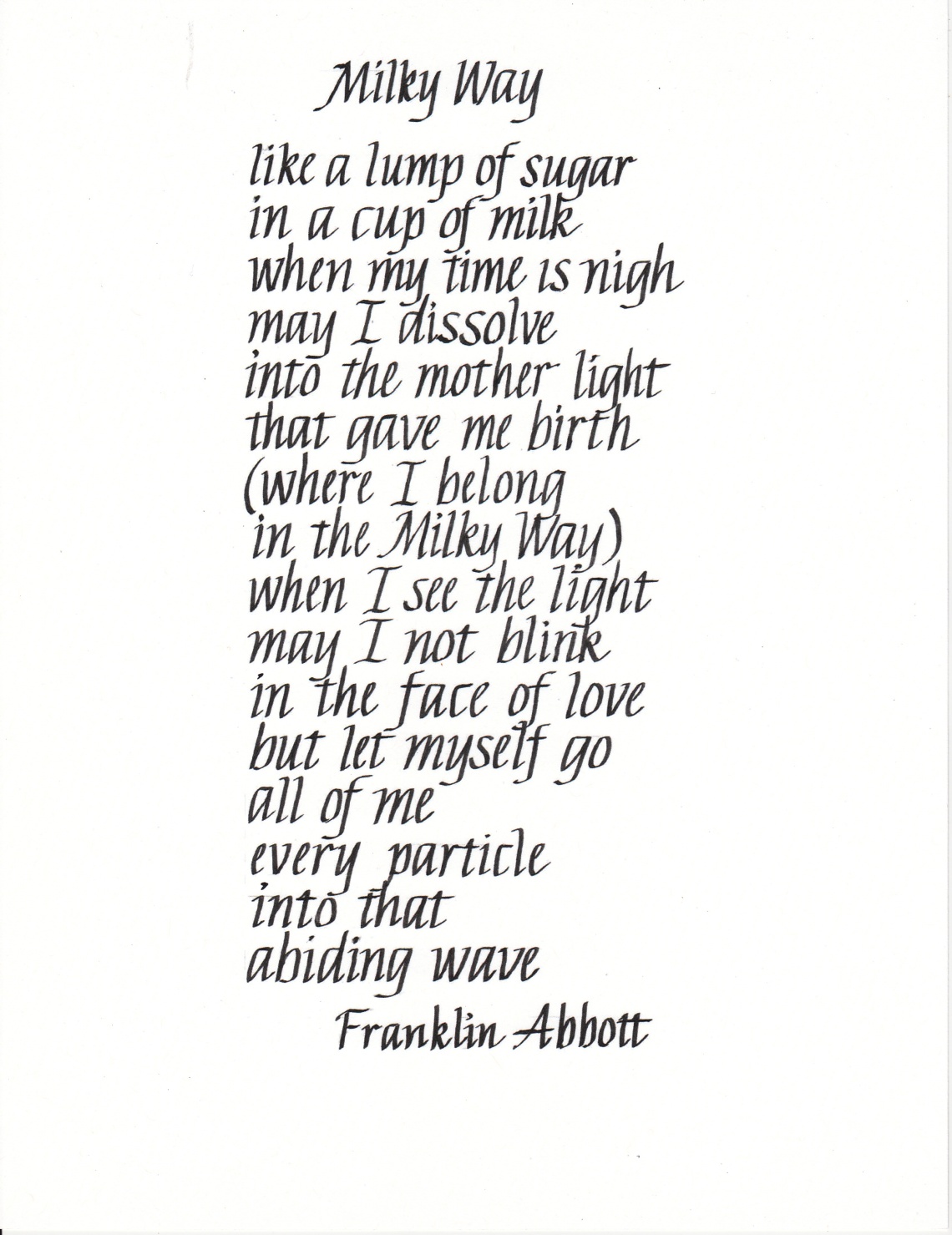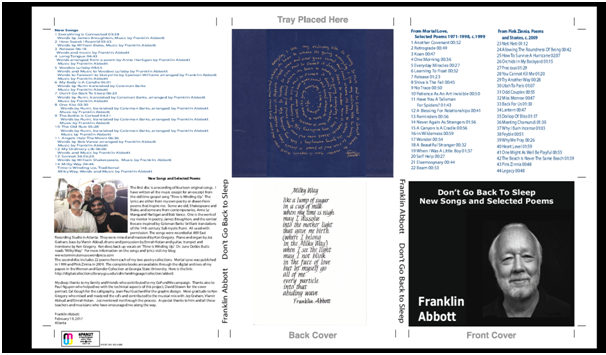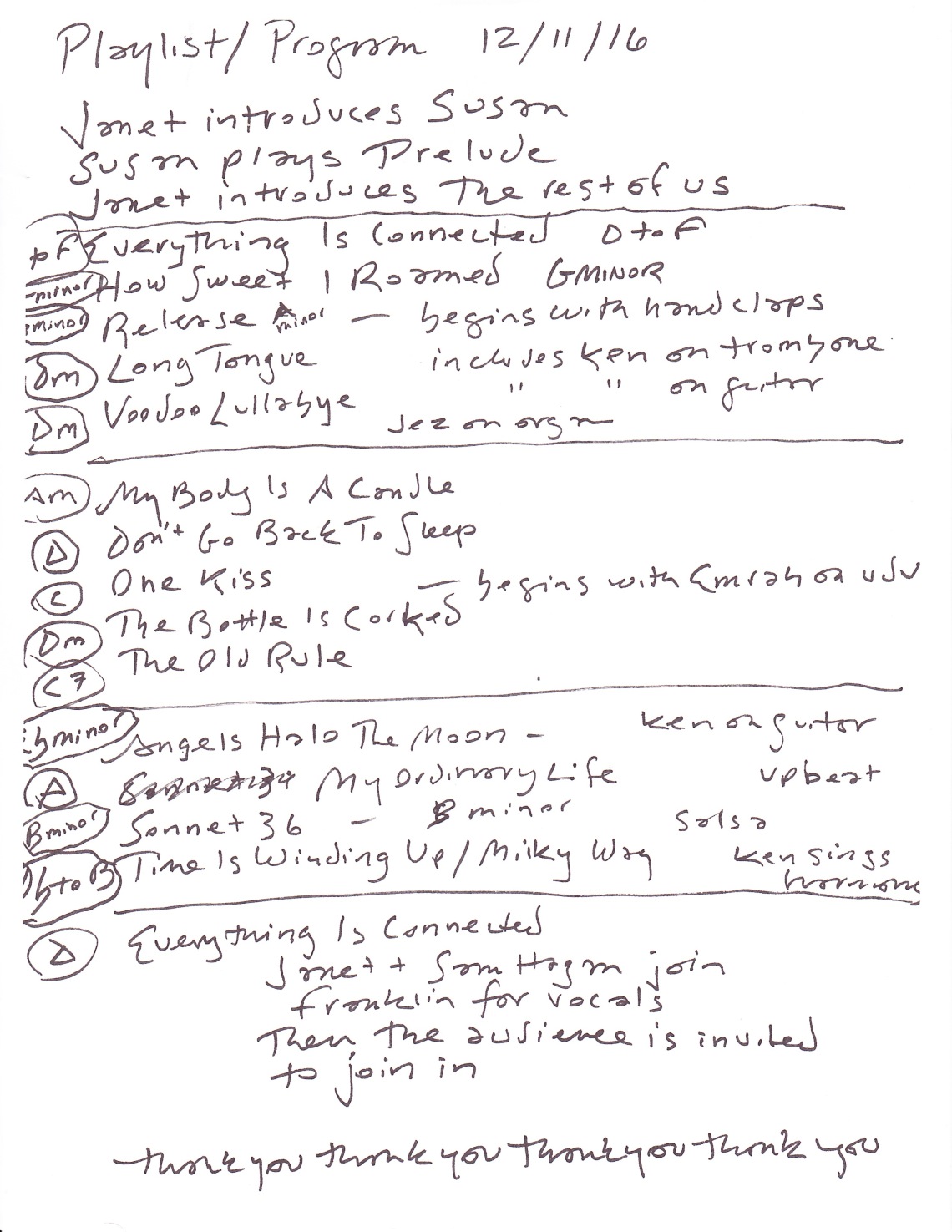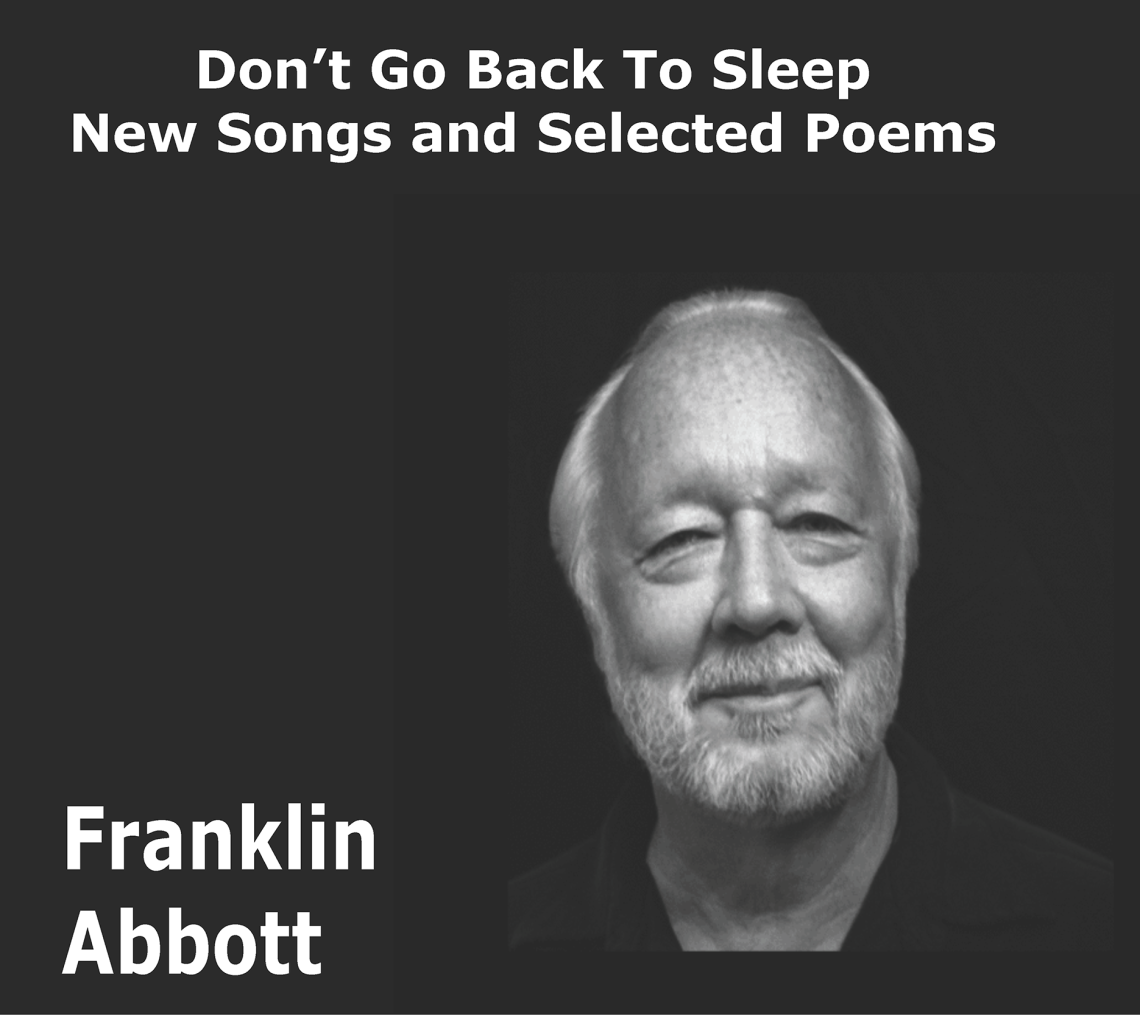
You can order the cd or download the music at https://store.cdbaby.com/Artist/FranklinAbbott, https://franklinabbott.hearnow.com or download the music from Soundcloud
The first disc is a recording of fourteen original songs. I have written all the music except for an excerpt from the old time gospel song “Time Is Winding Up.” The lyrics are either from my own poetry or drawn from poems that inspire me. Some are old, Shakespeare and Blake, and some are from contemporaries, Ann Hartigan and Bob Vance. One is the work of my mentor in poetry, James Broughton, and the central five are inspired by Coleman Barks’ brilliant translations of the 14th century Sufi mystic Rumi. All words that are not mine are used with permission or are in the public domain.
All the songs were recorded at 800 East Recording Studio in Atlanta. They were mixed and mastered by Ken Gregory. All except “Sonnet 36 were the first, second or third takes in the studio with piano and organ by Jez Graham, bass by Vlamir Abbud, drums and percussion by Emrah Kotan and guitar, trumpet and trombone by Ken Gregory. Ken does back up vocals on “Time Is Winding Up.” ”Sonnet 36″ and Dr. June Dobbs Butts’ spoken word performance of “Milky Way” were recorded live.
Some of these songs have been with me for half of my life. I wrote them in the early ’80’s using only the texts and a small hand drum. I have been working on the songs with Jez Graham for the past two years. He helped me turn simple melodies into sophisticated jazz. Vlamir Abbud and Emrah Kotan joined Jez and I in the recording process because of our mutual esteem for their musicianship. Ken Gregory came into the mix when he offered the spice of guitar and brass. Our ensemble, augmented by Dr. June, performed in front of a live audience at 80 East on December 11, 2016.
I have three hopes for these songs. First, that the listener will listen in the old style of music albums. The songs tell a story start to finish about the cycle of life. Second, that the listener will listen with good equipment. These recordings are intended to convey a depth and a texture that requires more than a home computer, car stereo or cellphone can offer without augmentation. And finally, that these songs take wing. I hope that they inspire other artists to perform and record them, that they add color and movement to film and dance, that they bring people together to hope, grieve and aspire to a brighter collective spirit. I offer them with profound respect for the musicians who collaborated with me and to our listeners who share our enchantment with others who share with others. May we all be blessed in this circle of sound.
I have recorded 22 poems from each of my two poetry collections. The poems form Mortal Love span almost thirty years of my life. The earliest was written while I was in college and the last when I was just short of fifty. I picked the ones that were the most universal, the ones you could have written because you lived through something similar. I have always relied upon my readers’ empathy to carry the meaning of my poems. If my poems were paintings they would be simple yet subtle.
The second group of poems come from my next book, Pink Zinnia and were written between the time I was fifty and the time I was sixty. I was both more and less passionate about life’s quandaries during that time. Passion both rises and falls with the passing of time and the accumulation of years. I feel so fortunate to be a survivor, that I am still here to give you a report. What I can’t say I sing and what I can’t sing I say. I hope you understand that words aspire to music and sometimes succeed if barely. When they do a poem becomes an incantation, a spell, a bit of magic. If any of these work for you please use them. They worked for me and still do but only if I make them a gift. Here you go. Given in gratitude.
Both books are available online through the digital archives at Georgia State University where my papers are housed in the Women and Gender Collection: http://digitalcollections.library.gsu.edu/cdm/landingpage/collection/abbott
song notes for Don’t Go Back To Sleep (click on images to enlarge)
- Everything Is Connected
This was the second to last song I wrote for the album. In 2015 I worked with pianist Bob Strain and fellow vocalists Sam Hagan and Janet Metzger to present a series of songs based on James Broughton’s poems that had been set to music and recorded by Ludar. I wanted to include a song with Broughton lyrics but Ludar had used many of the best ones. I traveled to Ghana in 2015 for the 50th birthday celebration of my friend Nuumo Gbelenfo III and stayed with him and his family. Nuumo had constructed a new house that was all marble on the inside. It had yet to be furnished so it was the perfect echo chamber. I had taken with me a tiny book of Broughton poems, When In Doubt, Twirl, and decided to work on his birthday poem to Imogen Cunningham as a song. I wanted something to open the album and this song draws a perfect circle. When I first performed the songs last December I opened and closed the concert with this song. Janet Metzger and Sam Hagan joined me on the second version and we had an audience sing along.
- How Sweet I Roam’d
I’ve carried this song with me for many years. The words are from a poem that William Blake wrote when he was 14 in 1771. In the collection of his poems published as a pocket book by The Laurel Poetry Series the title of the poem is simply “Song.” It is a poem about the loss of innocence, perhaps even a lament over puberty. I’ve had the little book since 1973, the year I graduated from college and lost my innocence in the world of work. Blake was not appreciated in his lifetime either as a poet or an artist. He did not fit into his society and like Rumi and Broughton is considered a visionary poet.
- Release
I wrote this poem in my early ’30’s and soon after heard the melody for it. Like the previous song I have carried it around on my internal jukebox for half my life. I wrote it while I was in long term psychotherapy with Earl Brown, one of my mentors. I was learning how to get comfortable with my emotions. As a young man I prided myself on being cool on all occasions. Depression is the repression of expression. Earl helped me find a way to safely express my feelings. Anger was the most difficult feeling for me to express. This song is about how I learned to let go. It was published in my Mortal Love collection.
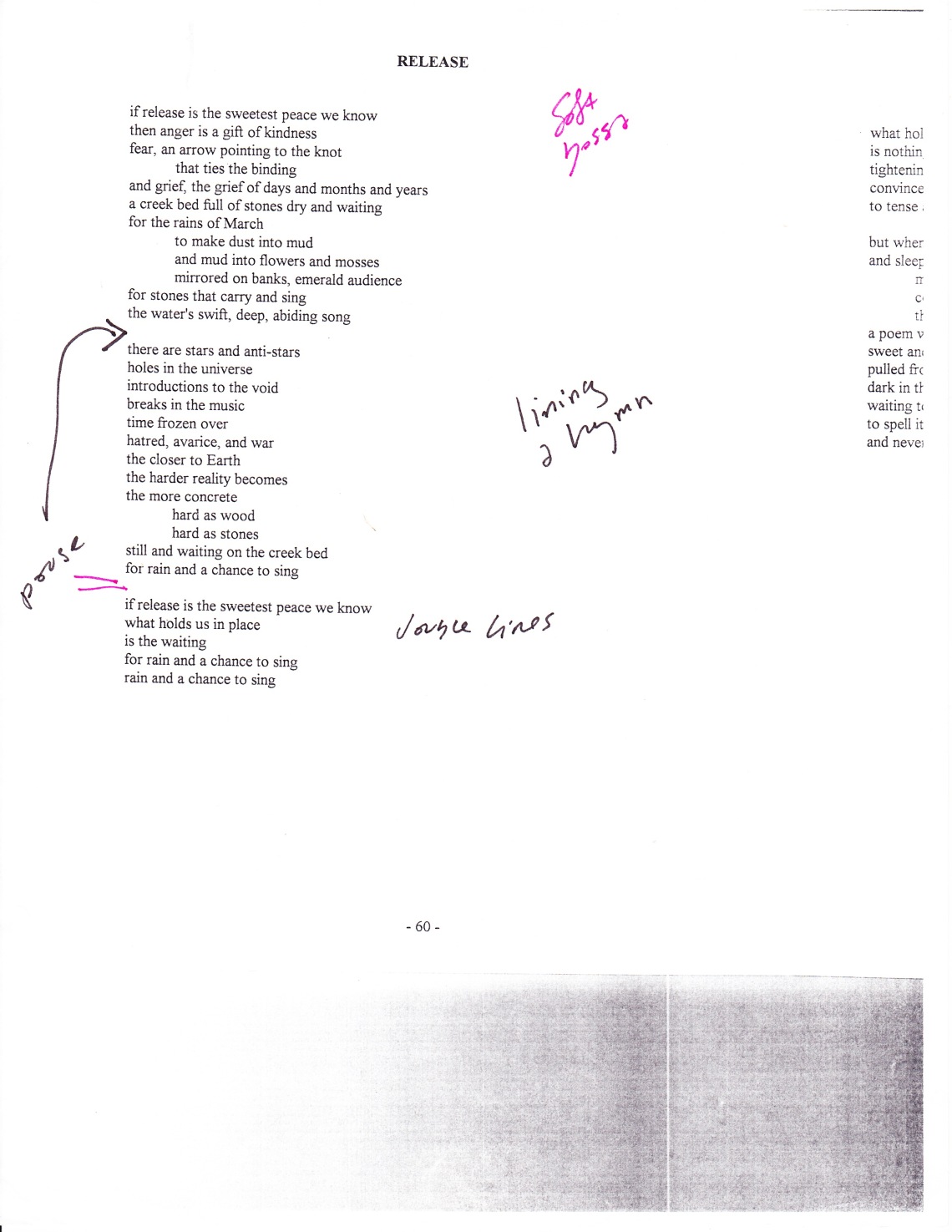
- Long Tongue
I began traveling in my 30’s and one of the first places I visited was Ireland. I fell in love with an Irishman and returned many times. This was before everything was available on the Internet and I would buy books and record albums to bring back home that I couldn’t find in the U.S. One of my favorite books is a book of poetry by Anne Le Marquand Hartigan is Long Tongue. Her title poem became another song in my head. It is a powerful poem about the gifts of poetry. Anne drew her inspiration from Irish folk lore. Poets were considered unlucky to have as a member of the family. A woman poet, doubly so because her powers were twice as strong. A tell tale sign of a poet was an especially long tongue. The gift of poetry was received in a variety of ways including drinking the milk of a fairy cow or eating a sacred salmon. Powers included controlling animals, keeping dancers dancing and drowning sailors at sea. Anne has graciously allowed me to use parts of her poem in the lyrics of this song that is based on it.
- Voodoo Lullaby/Farewell to Storyville
“Voodoo Lullaby” is in my second book of poems, Pink Zinnia. Years ago when I visited New Orleans I went to a tiny museum dedicated to the practice of Voodoo. I wrote down a quote I saw on the wall, words from Marie Leveaux, the voodoo queen of New Orleans, “There is no sin. There are no mistakes. There is only life.” I transfered the quote to a note card and kept it on my desk for years pondering its meaning. The poem it inspired is an homage to Marie Leveaux who was actually two people, a mother and a daughter who looked alike and had the same name. They appear at times as a big black crow. Their nemesis, Papa LaBa, is a sinister figure who some suspect to be the devil. “Farewell to Storyville” was written in 1920’s by Spencer Williams. I found the song in The Big Book of the Blues. I can’t read music and I had never heard the song (and this was before you could Google anything and everything) so I made us music for the words. It is the story of the end of the “entertainment” district in New Orleans after politicians and police sought to win points by enforcing morals laws. It resonated with me during the ’80’s when life in the gay community was changing as a consequence of the AIDS epidemic.
- My Body Is A Candle
Half a lifetime ago I attended a songwriting workshop led by Sy Kahn at the Omega Institute in upstate New York. I don’t play an instrument so I only had a tiny hand drum to work with. I also had a copy of Open Secret, the first book of Coleman Barks’ remarkable translations of Rumi. Rumi lived in the thirteenth century in what is now Turkey. He was the son of a famous preacher and scholar who moved his family from what is now Afghanistan to Konya to avoid the chaos of Genghis Khan and his invading army. Rumi was also a scholar and preacher who followed in his father’s traditions until he met the Sufi mystic Shams of Tabriz. He and Shams developed a deep mystical union that transformed Rumi into a whirling poet. Shams was one of three beloved companions that Rumi had in later life. Each of them mirrored the divine back to Rumi and his prolific poetry was composed in their honor. This song and the next four were written at the songwriting workshop and again carried in my inner juke box for half my life.
- Don’t Go Back To Sleep
The title song of the album. It seems very timely nowadays.
- One Kiss
The sound of the water wheel was thought to have healing properties and was often found in rose gardens like the garden of Hosam, Rumi’s last beloved and scribe.
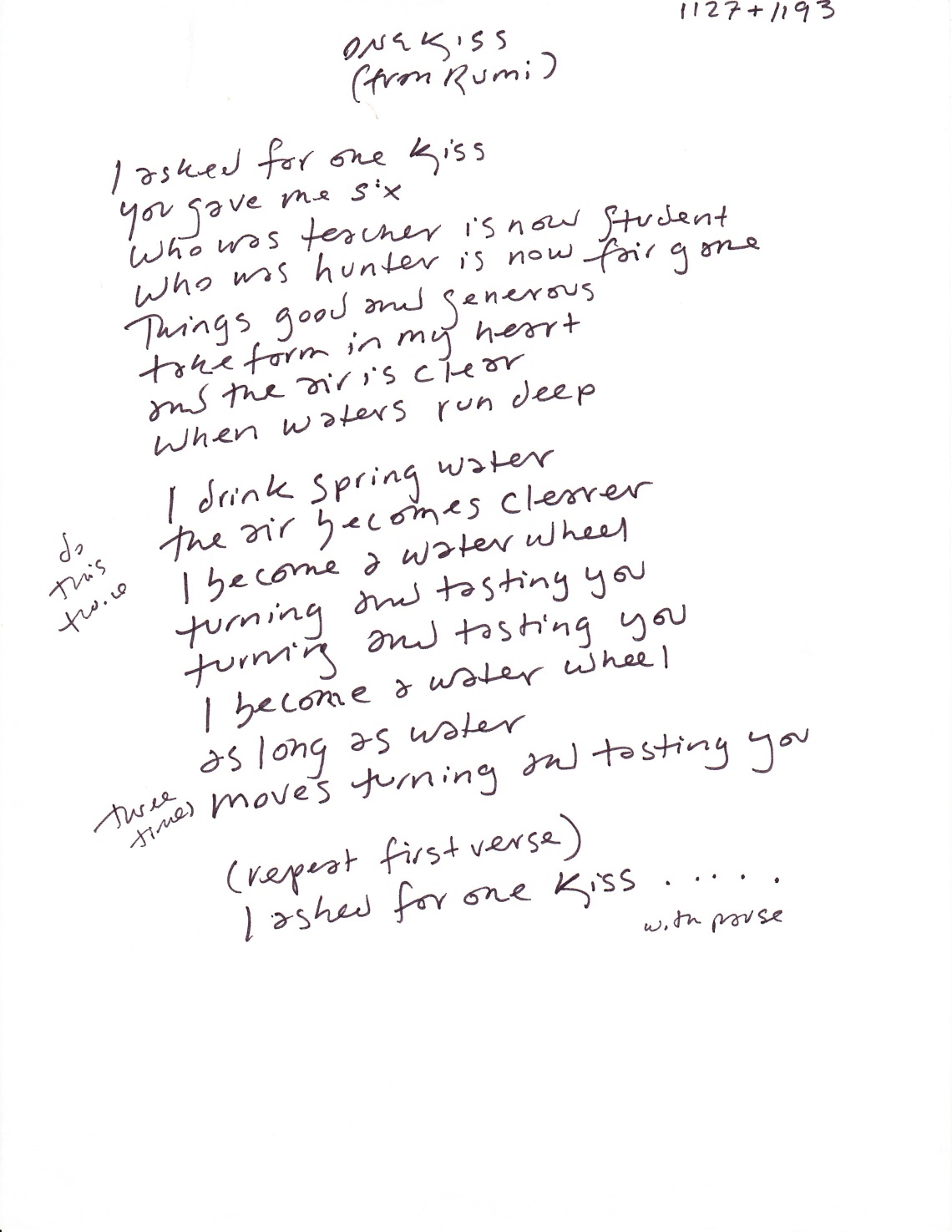
- The Bottle is Corked
The disappearance and probable murder of Shams of Tabriz was a turning point for Rumi. Everything he had learned from Shams in their short few years together came to the surface as he grieved the loss of his beloved companion.
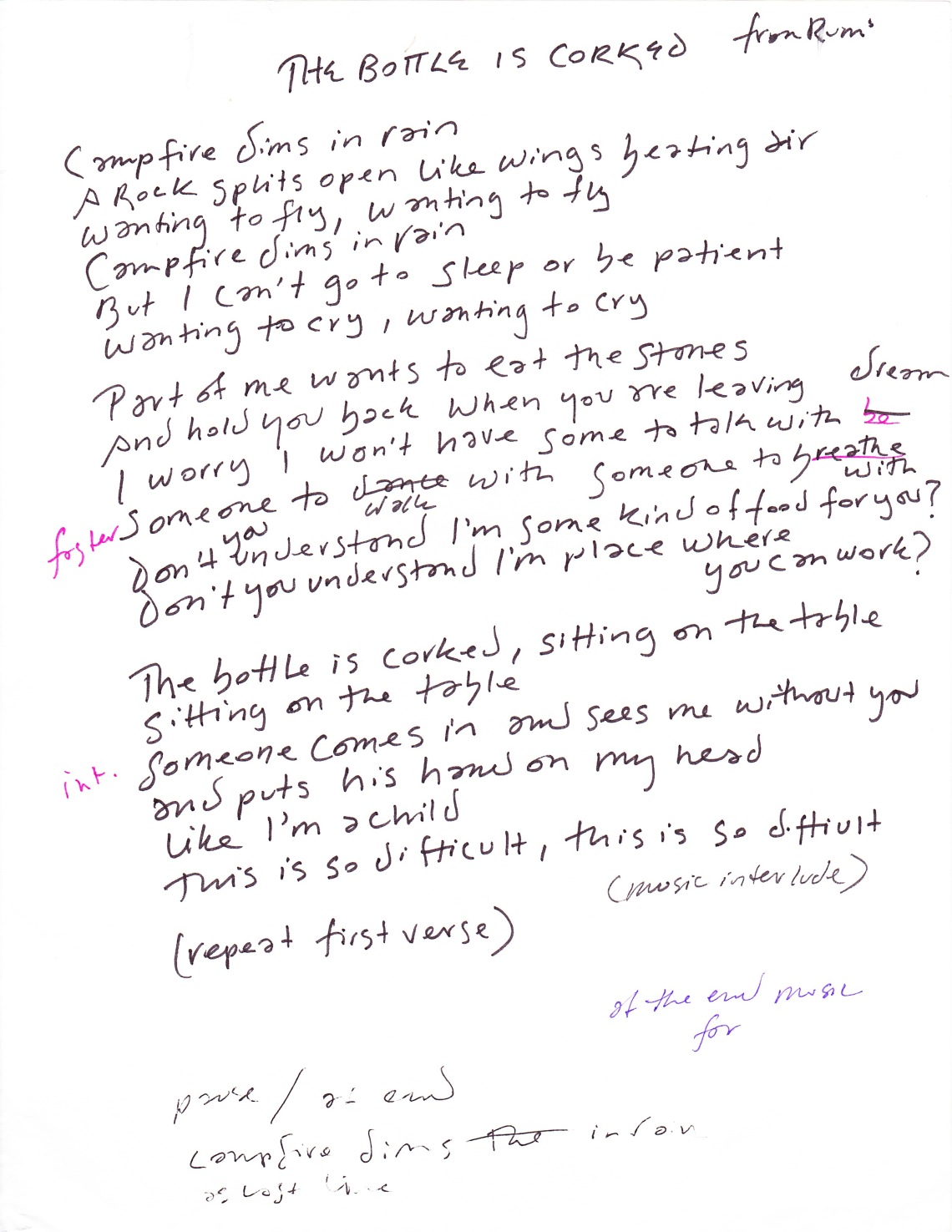
- The Old Rule
Because Rumi was so unconventional among the Muslim clerics of his day (music and poetry were more important to him than theory and the whirling meditation with its accompanying music was so unorthodox) that his followers tended to be from the working classes where drinking and brawling were commonplace.
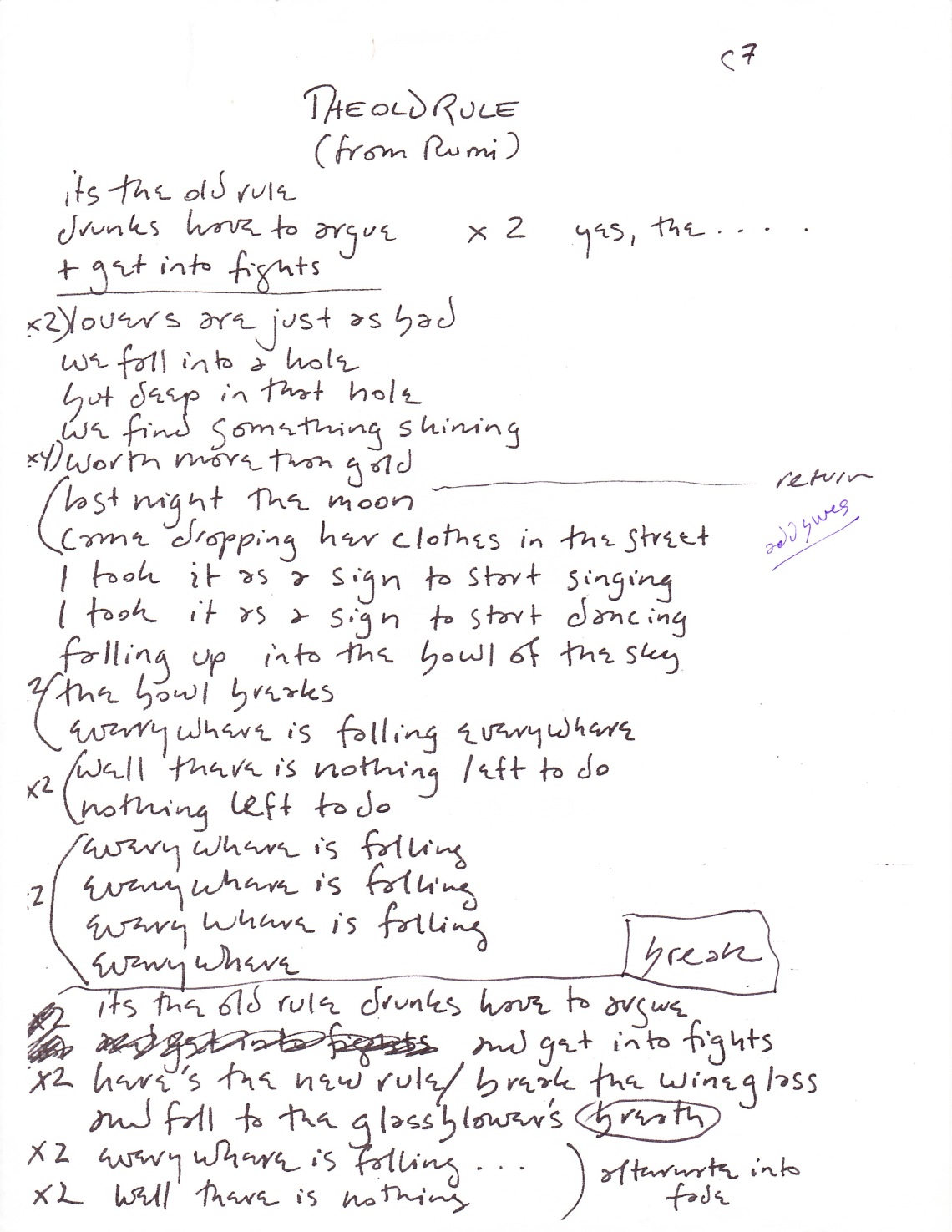
- Angels Halo The Moon
My friend Bob Vance wrote the poem that the lyrics are taken from. Bob and I met at the National Conferences on Men and Masculinity, a kind of men’s auxiliary to the women’s movement. We participated as “culture workers.” The term culture worker referred to poets, musicians and other artists whose work supported the movement. I kept a copy of Bob’s poem on my piano and composed the song by making chords on the black keys. When Jez Graham was working with me to arrange the song he told me the key was E flat minor 7. Bob, who kindly granted me permission to quote from his poem for my lyrics, lives in Petoskey, Michigan where he works people in need and writes poetry, gardens and takes photographs.
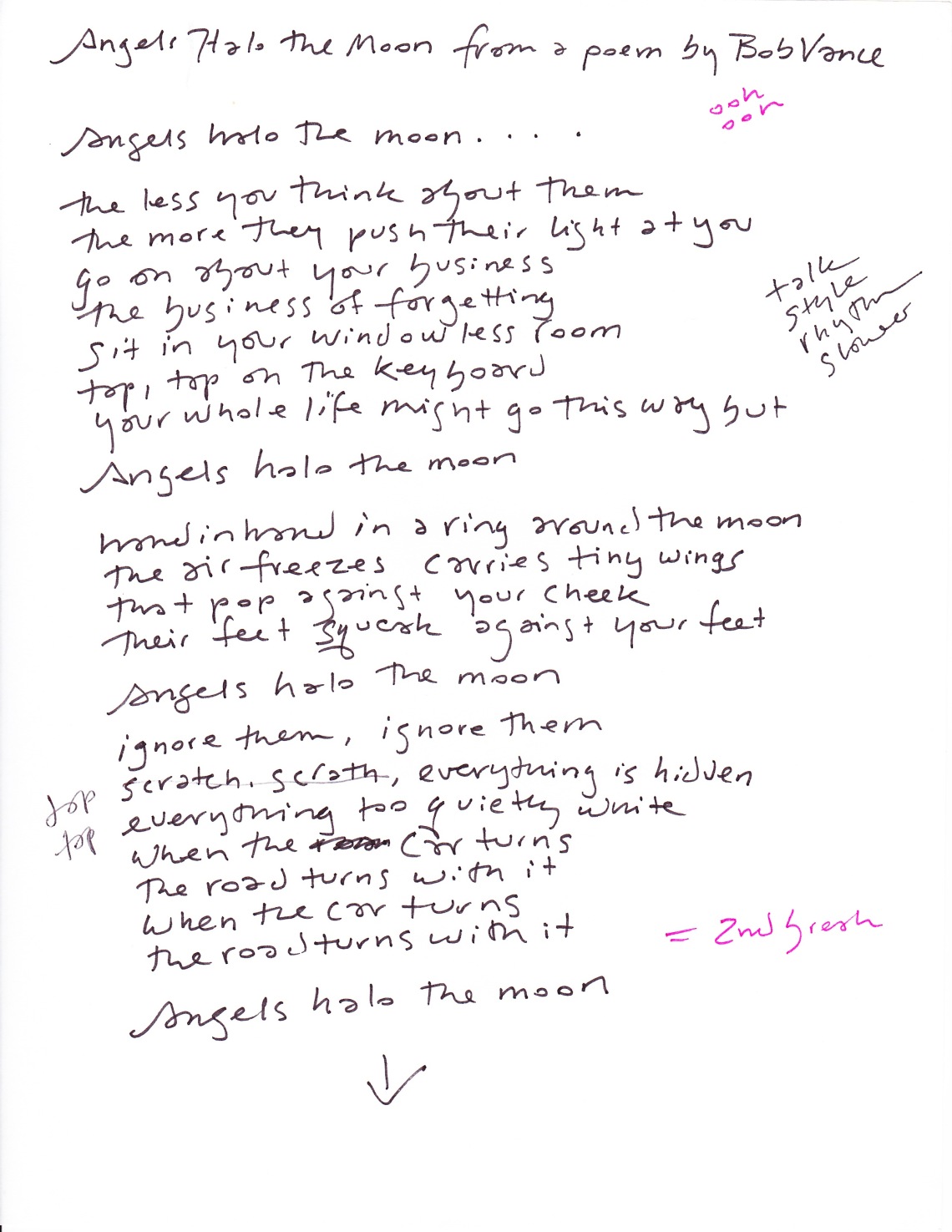
- My Ordinary Life
You can see the calligraphy I did for the poem inside the album cover. I wrote the poem in 2002. I had been in a state of anxiety after the 9/11 attacks. A bad tooth took me to the dentist for a crown. The pain medicine the dentist prescribed was taking affect the evening after the procedure. Relieved and relaxed, I began to write in a spiral and published the poem as a holiday broadside that year.
- Sonnet 36
This is the last song I wrote for the al
bum
. Last year Rupert Fike invited me to read at a Shakespeare celebration at Java Monkey in Decatur, Georgia where I live. It was a marathon reading of all the sonnets. Rupert assigned Sonnet 36 to me. It is not one of the well-known sonnets and it is a tongue twister. In practicing for the reading I found I could sing it better than I could say it. Sonnet 36 is about a time when the political and the personal were deeply intertwined. England had become officially Protestant but many remained loyal to Roman Catholicism. Alliances were always shifting under the mercurial reigns of the Tudor monarchs. Here two lovers are caught in the crossfire.
- Milky Way/Time Is Winding Up
“Time Is Winding Up” is an old white gospel song. My paternal grandparents sang music like this in a gospel sextet called The Double T’s. They made one record which has been lost to posterity. I don’t remember them singing this song. I heard it on an album called “White Gospel” and it is very old. I am not sure of its origins. My poem “Milky Way” is a favorite of my friend Dr. June Dobbs Butts. She said that it helped her through a health crisis when our mutual friend Jeff Glauser shared it with her. She was at the performance in December of last year and read the poem for the audience. “Milky Way” is in my Pink Zinnia collection. It is my meditation on a good death.
